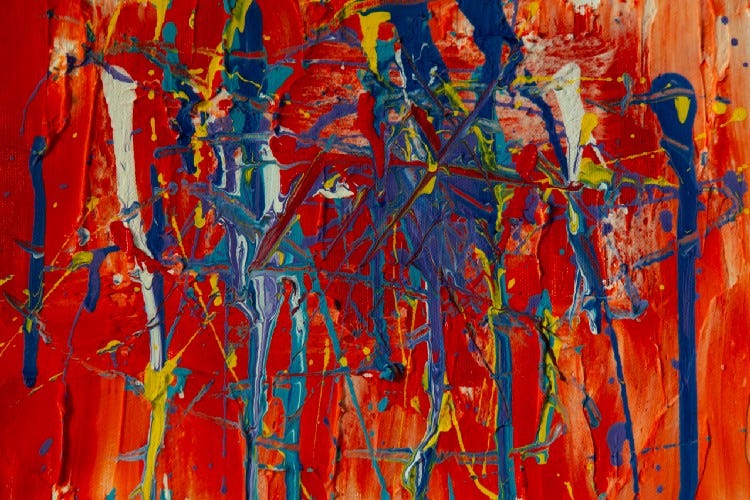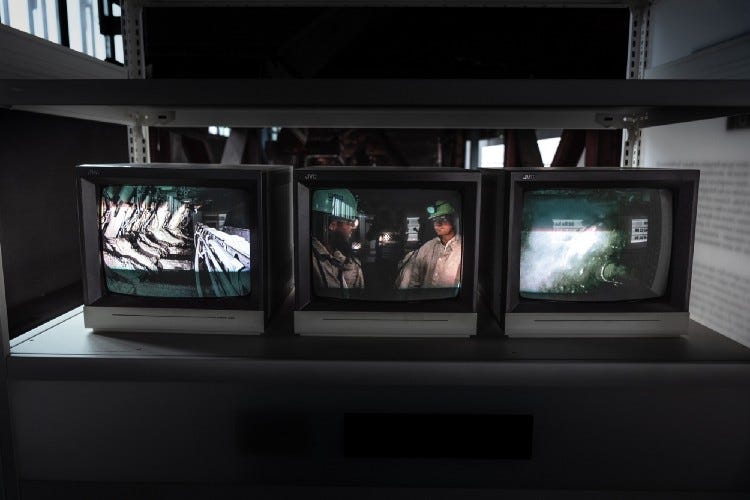
You know the drill: I share the best stuff I’ve been reading, listening to and watching lately. Let’s get right to it.
BOOKS

Evelyn Waugh: Decline and Fall (1928)
Excellent black comedy. Had so many thoughts on it they turned into their own post. Coming soon.
MUSIC

James Brown: Black Caesar (1973)
Song for song, James Brown is one of my favourite artists of all time. But until relatively recently I’d always been wary of delving too deep into the albums, assuming he was basically a singles artist who padded his LPs out with blues jams and sentimental ballads. Big mistake. As a soundtrack album Black Caesar should be as fillerish as records get, but in fact it’s packed with gems. I’ve no idea why “Down and Out in New York City” isn’t a stone-cold classic — a James Brown song with a chorus! And what a chorus! — but as it is I might never have heard it if it hadn’t been featured in the recent Malcolm and Marie. As for the rest, you have an actual stone-cold classic in “The Boss”, tasty instrumental noodling on “Blind Man Can See It” and “White Lightning”, uptempo dance music on “Make It Good to Yourself”, frenetic thrills on “Chase” and Brown-scatting-accompanied-by-himself-on-piano on “Like It Is, Like It Was”. Plus a blistering guest spot from the wonderful Lyn Collins on “Mama Feelgood”. And yes, a little filler. But it is a soundtrack album.
Various classic blues artists (1920s-70s)
Besides Howlin’ Wolf and John Lee Hooker, I’d never really investigated the blues masters beyond a compilation or two and scattered tracks by Albert King, Little Walter and a few others. But I recently picked up compilations by Muddy Waters, Elmore James and Blind Willie McTell — who you may have heard of thanks to this man — and listening to them inspired me to cast the net further and get a serious Spotify playlist going.
So far my favourite discoveries are James (that muscular voice! That attitude! That slide! That groove!) and Mississippi John Hurt (that warm, engaging voice! Those beautiful melodies! That friendly, inviting feel!). I like to think I can detect echoes of their singing styles in my beloved Bob Dylan — I hear a lot of Hurt’s gentle tunefulness in his early sweet side, and I hear James’ startling bursts of speak-singing in his electric-trilogy sarcastic side.
I knew the 1960s British blues revival owed their sound to these guys, but I hadn’t realised just how much they directly lifted from their source material — I’ve been recognising riff after riff and line after line from all those Bluesbreakers and Led Zeppelin songs. I’m also hearing startlingly crunchy riffs (this is from 1951!!), seriously distorted harmonica (this is from 1952!!) and truly wild guitar solos (this is from 1954!!). (1954!! That’s before Elvis even had a drummer!)
Funnily enough the artist I’ve been having the least success with is perhaps the most famous — Muddy Waters. Now his ’70s update of his classic “Mannish Boy” has always been my favourite classic blues of them all. But nothing else I’ve heard comes close for me — I just don’t hear the hair-raising vocals of Wolf, the wild energy of James, the intricate fingerpicking of McTell, the guitar chops of Albert King or the atmospheric darkness of Lightnin’ Hopkins. No element of the sound really grabs me in either his acoustic or his electric period. So far anyway. It’s early days.
FILMS, TV & A LITTLE THEATRE FOR A CHANGE

Beyond the Fringe (1962 performance)
As you may have gathered by now I’m big on cultural archaeology — if rock’s based on the blues I want to hear the blues, if blues is based on West African music I want to hear West African music, etc. So when it comes to comedy, if a lot of today’s stuff can be traced back to Peter Cook, and if Peter Cook’s career can be traced back to this show, I want to see this show. Fortunately it’s available on YouTube.
The facts: Beyond the Fringe was a stage revue in the early ’60s starring Cook, Dudley Moore, Alan Bennett and Jonathan Miller that took the West End by storm before becoming a hit on Broadway. Its willingness to mock authority and tackle pretty much any subject was revolutionary at the time and paved the way for all the great British satire to come, as well as being heavily influential on surrealists like Monty Python. (Read more about it here.)
The opinion: I enjoyed this a lot. I was surprised at how gentle the jabs were by modern standards (hell, by Evelyn Waugh’s standards), at least on the night that’s been preserved. The show doesn’t go after political institutions nearly as hard as Yes, Minister or The Thick of It, but on the plus side its remit is a lot broader: it affectionately pokes fun at everything from Anglo-American relations to class to Elizabethan theatre to the Second World War. The parodies of Shakespeare and modern philosophy may be the most eloquent comedy I’ve ever seen — not side-splittingly funny, but dazzlingly articulate and 100% accurate (Miller and Bennett’s “Oxford” mannerisms are perfect). Meanwhile Bennett’s take-off of a bland, rambling Church of England sermon is genuinely priceless — the precursor to Father Trendy and Billy Connolly’s “football match” homily.
Then there’s Moore, the most versatile actor and general all-rounder of the bunch. As a pianist myself, I gotta say he could outplay Bill Bailey and Tim Minchin on a child’s toy Casio if all his limbs were tied behind his back, he was asleep and he was nowhere near the Casio. He’s amazing. In keeping with the show’s highbrow tone he chooses Beethoven to parody, and he gets everything exactly right. The way he takes the simple theme, obsessively develops it, plays it in different styles and rhythms, gets busy with the left hand, uses just about every note on the keyboard, ends the piece a million times — exactly right. Again, not side-splitting so much as just technically jaw-dropping: never mind playing it, how do you write this stuff?
Finally there’s Cook himself, the show’s main writer and the general Shaper of British Comedy for Years to Come. It’s already obvious from Beyond the Fringe that satire is only a small element of what he does: his main goal is to use language as inventively as he possibly can. (Some day I’m gonna write a post about the similarities between him and my favourite comedian, Norm Macdonald: both got pigeonholed in the “satire” genre early but are surrealist storytellers at heart; both are in it for the comedy, not the career ambition; both are reclusive by fame-hungry celebrity standards; both use language in a completely unique way; both do their best work in character; both use improv as a key element of their shtick; both are fundamentally Agents of Chaos who want to Make Everything as Silly as Possible, no more, no less.)
So we get the “One Leg Too Few” sketch, where Cook tells a hopping Dudley Moore that he’s not right for the part of Tarzan. We get “The Great Train Robbery”, which reminds me of one of those Two Ronnies bits where the wordplay is so clever it doesn’t seem right to call it “punning”. Is it still punning if you’re subtly twisting the meanings of phrases rather than just calling attention to the fact that some words sound like other words? Anyway.
And then we get the “Experiences Down the Mine” monologue, which…well. Like a lot of my favourite comedy, this one feels like something slightly different to comedy. The story is funny, but somehow calling it funny feels like it’s sort of missing the point. As with all his creations Cook’s fully in character but somehow not the character at all, just eternally Peter Cook, staring at you with that quiet, tragic Zen stillness. His miner’s proto-Monty Python ramblings communicate something that — to me anyway — goes beyond humour into something deeper and sadder, and all without trying to. Like a Kate Bush performance, the whole thing has a mysterious effect on you that’s hard to put into words because the emotions have nothing to do with words. It’s surrealist art. You can’t define it.
And that’s how I feel about Beyond the Fringe in general: it transcends not just satire but all categories. Like Bo Burnham’s what., it’s a comedy show, but it’s more just a show — a totally unique blend of history, politics, social commentary, wordplay, music, surrealism, theatricality and plain silliness.
As I watched “The Aftermyth of War”, a sort of mini-play about World War Two and its effects on everyone who participated in it, I noticed I was actually getting a little moved. Here I was watching four young men processing the cruelties, distortions and traumas of an unthinkable catastrophe that had happened in recent memory, and making something weirdly beautiful out of it all. Now their interpretation has itself become part of history. And to paraphrase the miner, what a fascinating old part it is.
The King of Comedy (1982)
More black comedy. This was a rewatch for me — first saw it in college — and I enjoyed it just as much this time round. Maybe the least famous of the classic Scorsese-De Niro collaborations, The King of Comedy was seriously underrated at the time and remains seriously underwatched today.
Like so many comedies of its type, the film works on two levels: there’s the disconnect between how talented De Niro’s mentally unstable aspiring comedian thinks he is (world-class) and how talented he actually is (he’s alright), and then there’s an underlying message about the wider sickness prevailing in a culture that says it doesn’t matter whether you’re renowned or notorious as long as you’re famous. (If all this sounds familiar, yes, 2019’s Joker was heavily based on this film.)
Some critics weren’t convinced by the movie’s uncentred feeling or its odd tone — Empire said ‘Neither funny enough to be an effective black comedy nor scary enough to capitalise on its thriller/horror elements’ — but the unpredictability and emotional ambiguity are exactly what I like about it. It’s true that the movie’s so dark that I’d hesitate to call it a comedy at all: the extent of the “king’s” delusions and the things he and his psychotic friend are willing to do to get what they want are truly unsettling. And it’s also true that whenever things are in danger of getting too heavy and uncomfortable a punchline will come along and half-save the day. But don’t you get a similar mix of laughs, grimaces and unsettling plot twists in the most effective satire I’ve ever read, Catch-22? Or, I dunno, in life?
Killing Eve season 1 (2018)
Yet another black comedy. Well, a thriller with black comedy elements. I’ve just seen the first season so far: enjoying it, nice understated acting, good sense of humour (of both the “wry English” and the “seriously dark English” variety), plenty of action, sometimes fun and sometimes seriously disturbing villain, lots of snappy dialogue that sees the usual “snappy dialogue” tropes coming and swerves to miss them, and the portrayals of friendship and marriage are refreshingly down-to-earth and un-clichéd — but of course they are, the writer’s Phoebe Waller-Bridge, whose Fleabag I was just raving about the other week. Underappreciated Scorsese films are all very well, but you’ve got to have a fun and undemanding show to pull out when you want to sag, and if this one keeps the quality going for the next couple of seasons (both written by other people) it’ll do that for me for the next while. Provided I can get over those last few episodes — when I said “disturbing” I meant it…




